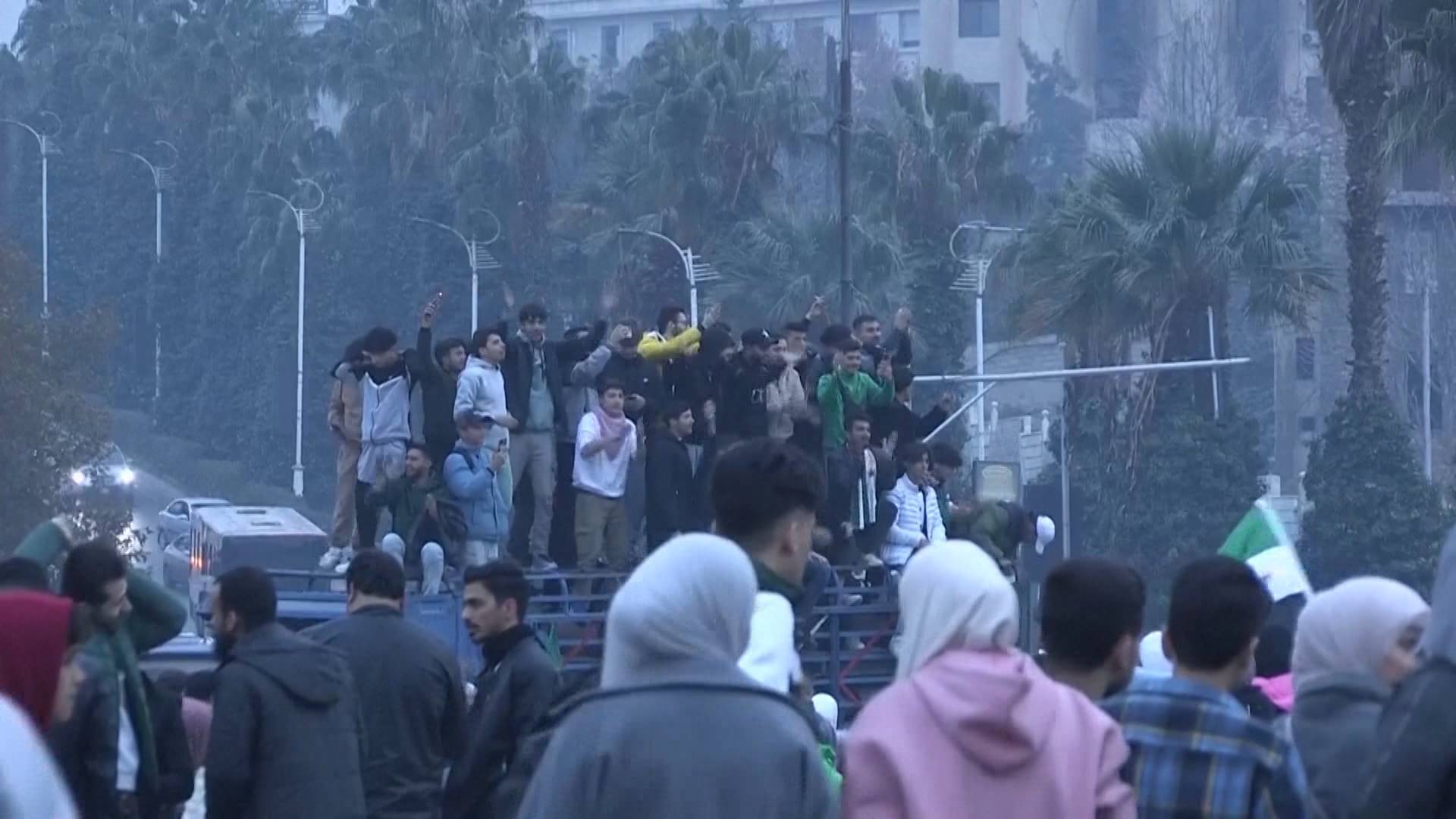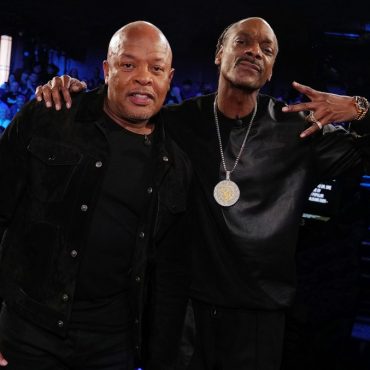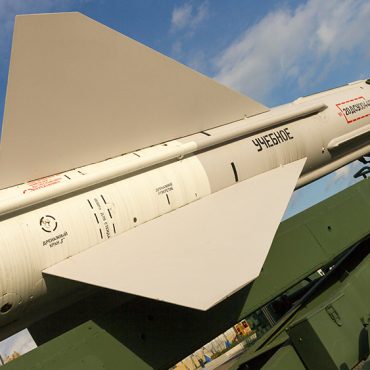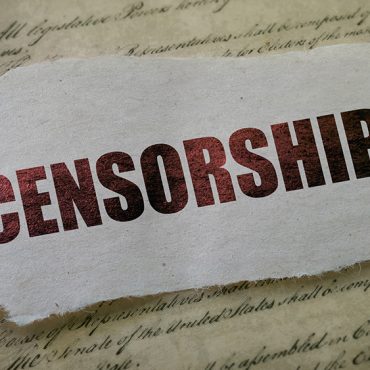This is a rush transcript. Copy may not be in its final form.
NERMEEN SHAIKH: We begin today’s show looking at the toppling of the Assad regime in Syria and how it could reshape the Middle East.
U.S. Secretary of State Antony Blinken has arrived in Jordan for emergency talks on Syria. He heads to Turkey next.
This comes as celebrations continue in Syria over the fall of Bashar al-Assad, but many are concerned about what might happen next.
In northeast Syria, more than 100,000 people have been displaced due to fighting between Turkish-backed forces and U.S.-backed Kurdish forces. Israel has carried out over 480 airstrikes on Syria since Sunday. Israeli troops have also seized part of the Syrian Golan Heights.
In Geneva, the U.N. special rapporteur on human rights, Ben Saul, criticized Israel’s actions in Syria.
BEN SAUL: There is absolutely no basis under international law to preventively or preemptively disarm a country you don’t like. I mean, if that were the case, it would be a recipe for global chaos, because lots of countries have adversaries they would like to see without weapons. This is completely lawless, that there is absolutely no basis in international law to do it. But it’s a continuation of what Israel has been doing in Syria for at least a decade.
AMY GOODMAN: Meanwhile, in Damascus, the head of the armed group HTS that led the coalition against Assad has vowed to dissolve Assad’s security forces and shut down his notorious prisons, including Sednaya, which has been described as a “human slaughterhouse.”
We begin today’s show with two guests. Joseph Daher, a Swiss Syrian left-wing activist and scholar, author of Hezbollah: The Political Economy of the Party of God, as well as Syria After the Uprisings: The Political Economy of State Resilience, he’s in Geneva, Switzerland. And in Homs, Syria, we’re joined by Marwa al-Sabouni, award-winning Syrian architect, urban thinker and writer, author of two internationally acclaimed books, The Battle for Home and Building for Hope.
We welcome you both to Democracy Now! Marwa, let’s begin with you in Homs. Just describe the scene there after the fall of Assad.
MARWA AL-SABOUNI: Well, thank you for having me, Amy.
The general atmosphere is an atmosphere of relief, of joy, of celebration, like you mentioned in your report. But also there’s this background of apprehension, of uncertainty, of observing what — the strikes that Israel has been conducting since the first moment of the Assad’s fall.
NERMEEN SHAIKH: And, Marwa, could you talk about your piece for Middle East Eye? You wrote, “Syrians have flown the cage. We must not lose our freedom again.” If you could elaborate on the points you make in the piece?
MARWA AL-SABOUNI: Well, primarily, we were, for now over 50 years, under one oppressional regime that, you know, was denying Syrians from all liberties. And now with the lift of this regime, people have this sense of regained freedom.
But like I mentioned in the piece, there are a number of dangers around us, mainly by the foreign powers, which are looking at the map of Syria, proposing division, also planning the future of Syria, mostly by the vacuum and the absence of Syrians from the political scene due to the oppressional regime.
You have something that is rarely on the news, that is the control of the U.S. over the petrol in the eastern part of Syria, where the Kurdish forces, backed by the U.S., do the guarding effort for that. And for the past 14 years, even under the Assad regime, we were denied as Syrian citizens from access to fuel, from access to electricity. We don’t have electricity. Imagine living, you know, and having two hours of electricity within the 24 hours. So, it’s each six hours, you had half an hour of electricity. And imagine how this will reflect on the economy, on health sector, on production and all of that. Also you don’t have heating. You don’t have fuel for commuting. So, each car has access to only 20 liters of fuel every 15 days. So, the U.S., you know, just grabbed this piece of resource and put its hand, while the regime was here, and continues to do that until now.
And so, mainly, Syria is up for grabs now. You have all those powers who can have access to those resources. And now, like your report mentioned, we are completely disarmed. We are in a sitting duck position. And God knows what could happen to the Syrians afterwards.
NERMEEN SHAIKH: So, I’d like to bring in Joseph Daher into the conversation. If you could respond to what Marwa said? You’ve followed Syrian politics for decades. You wrote a book called Syria After the Uprisings: The Political Economy of State Resilience. Your response to, you know, first of all, the fall of the Assad regime, what you see happening in Syria, the celebrations across the country, Assad statues being toppled and so on, Hafez al-Assad’s tomb being burned? Your response to what’s happened, and then, also, the role of foreign powers in his fall? In particular, you’ve focused on Turkey. Joseph?
JOSEPH DAHER: Thank you. Good morning.
I think the key issues to understand, first of all, following the overthrow of the regime, is how little and small the popular base of the regime was. It fell just like a house of cards. It was weakened structurally, politically, militarily, economically, and was basically surviving because of the assistance of Russia and Iran. And when these two forces were themselves weakened, this allowed the opportunity for the fall of this regime, which had, first of all, initially, a military dynamic which remained dominant, but, as we can see throughout the process, people started to go out in the street, attack symbols of the regime. And we can see in the past few days a large majority of the Syrian people were opposed to this regime, in all its sects, ethnicities. We saw statues being brought down in Kurdish-majority inhabited areas, but also in the coastal areas, Damascus, Aleppo, Suwayda.
So, this is the first thing to say, that for the first time in decades, Syrians have a hope for the future, to build a more equal, democratic, social society. Obviously, there is fear, but fear was existing for the past five decades. But at least there’s an opportunity to be seized.
With this opportunity to be seized, a lot of challenges exist. First of all, I think, internally, the groups, the armed opposition groups, such as Hayat Tahrir al-Sham or the Syrian National Army, are far from being democratic. Quite the opposite, they’ve shown the authoritarian behavior, policies in the past. Therefore, there will be a need to rebuild, you know, democratic movement, new popular organizations, trade unions, feminist organizations, and to rebuild basically struggle from below, to build the possibility of an alternative political structure, you know, social structure.
Again, there’s another kind of threat. There’s also the ethnic division between Arabs and Kurds that must be tackled. It must be tackled. And unfortunately, Turkey is playing a very negative role by pushing, you know, SNA forces, Syrian National Army, which is acting as a proxy of Turkey to attack Kurdish-held areas.
Just to precise something, autonomous administrative areas, where you have the majority of oil production, sold part of its oil to the regime. But even if, you know, the same unity came back and they had access to all the oil in the northeast, it won’t be enough for internal consumption. The vast majority of oil was imported from Iran, was provided from Iran.
And after, I want to speak about the external threat. Obviously, Turkey, I talked about it, but Israel, as well. Israel has no interest to see a democratization process in Syria, just as in the larger Middle East, because it knows it will bring more solidarity with the Palestinian cause. And this is why the day after, the actor that was the regime, the Assad regime, protecting the road with Israel for the past 40 years, preventing any form of resistance, attacked all the military infrastructure’s capacity, so at least a large majority of them, throughout the country to destroy them, to make the future Syrian state weaker and also send a political message to the future people that will be in power in Syria, that any kind of hostile and belligerent position towards Israel will be attacked by Israel and could create instability. So, these are the two main threats, internal and external, as well.
AMY GOODMAN: So, if you can talk about these Israeli attacks? There have been hundreds and hundreds, well over 500, attacks, as you just began. You have the U.N. the envoy, special envoy for Syria, Geir Pedersen, condemning Israel’s assault. What Israel is trying to accomplish right now in this massive bombing campaign of Syria? And you’ve written a book called Hezbollah. Where that fits into this at this point?
JOSEPH DAHER: Well, I think what we’ve seen in the past few days is this demonstration that as soon as the Assad regime fell — and again, it’s important to remind the auditors that contrary to some commentators that saw the Assad regime as a resistant actor against Israel, Israel had to intervene now to bomb massively the military structures, infrastructures of the Syrian state, because it was scared that the main actor protecting its borders for the past 40 years disappeared, and, again, sending a message, a clear message, to the future forces that will be in power in Syria that any hostile position could be punished directly.
Similarly, I think there’s another thing to take into consideration, is that Israel wanted a weak Assad and is not happy with the fall of this regime. Moreover, there have been increasingly documents that have been leaked showing that Assad regime was collaborating, in a way or another, with the Israeli state.
In this perspective, more largely, I think, definitely, Iran and Hezbollah are the great loser of the fall of the regime. But no resistance against Israel can be built with supporting authoritarian regimes or participating in the repression of people struggling for democracy, freedom and social justice. So, the weakening of Hezbollah and Iran is definitely the result also of Israel’s war on Lebanon and attacks in Syria against a pro-Iranian position, pro-Hezbollah position. But more largely, we have seen that these actors have not acted largely in the interests of the liberation of the region, of the popular classes, but, moreover, of the Palestinians.
And one other indicator in this direction is the latest statements of Hamas and Islamic Jihad. I personally don’t disagree with — I personally disagree with their politics, while supporting the right of resistance. But they saluted the liberation of the Palestinian people — or, the Syrian population from the dictatorship of Assad. That shows us that, basically, the key importance for a future strategy of liberation for Palestine is connected to the liberation of the population of the region.
And we have to come back to the statement made by Foreign Minister of Israel Avigdor Lieberman in 2011 following the overthrow of Mubarak in Egypt, that a democratic Egypt is a bigger threat to Israel than Iran. Similarly, a democratization process in the Middle East is the biggest threat for Israel.
AMY GOODMAN: I wanted to go — last month, the ICC, the International Criminal Court, decided to indict Israeli Prime Minister Benjamin Netanyahu, former Defense Minister Yoav Gallant, as well as the Hamas commander Mohammed Deif. The Biden administration rejected the ICC decision, claiming it doesn’t have jurisdiction to try Netanyahu. Well, this week, a reporter asked State Department spokesperson Matthew Miller if the U.S. would support Assad standing in front of the ICC as a war criminal. This begins with Matt Miller, who’s then interrupted by the Associated Press reporter Matthew Lee.
MATTHEW MILLER: So, we support the work of the ICC. I know that, obviously, we have disagreed with their —
MATT LEE: Wait a second.
MATTHEW MILLER: Hold on. Hold on. I’m going to — let me address it.
MATT LEE: No, you support the work of the ICC —
MATTHEW MILLER: We do support —
MATT LEE: — until they do something like with Israel.
MATTHEW MILLER: We — so, we have had a lot — let me just answer the question.
MATT LEE: And then you don’t like them at all, or the U.S.
MATTHEW MILLER: You know what, Matt? Let me — Matt, let me answer the question, because I was addressing that before you interrupted me. We obviously have had a jurisdictional dispute with them as it relates to cases against Israel. That is a long-standing jurisdictional dispute. But that said, we have also made clear that we support broadly their work, and we have supported their work in other cases, despite our jurisdictional dispute when it comes to Israel.
AMY GOODMAN: A jurisdictional dispute, Joseph Daher, if you could talk about that?
JOSEPH DAHER: Well, who will be surprised that the U.S. has double standards? We’ve seen this continuously and that U.S. has never pushed an agenda for real democratization of the region and has foreign policy according to its own geopolitical interests. So, this is, for me, not a surprise to see the difference in this kind of behavior.
We have to remind that the U.S. is the key actor allowing for the continuous genocide of the Palestinians in Gaza, for the continuous annexation of lands in the West Bank. Israel would not have been able to continue its genocidal war without the support of the U.S. Actually, Israel is only the implementer of U.S. politics, according to the Palestinians. Similarly, Israel could not have been leading a war on Lebanon without U.S. support.
And finally, Israel informed the U.S. of the invasion of Syrian lands, of the bombing of military infrastructures in Syria, with the support of the U.S., that also are seeking to protect its key ally in the region, Israel. So, it’s not a surprise at all to see these kind of double standards by the U.S. or any kind of Western states.
AMY GOODMAN: By the way, Yoav Gallant, who was one of those charged by the ICC, for whom there is an arrest warrant, just met with Brett McGurk in Washington, D.C., this week.
NERMEEN SHAIKH: And before we end, Joseph Daher, if you could talk about what you see unfolding in the next weeks in Syria? You spoke earlier a little bit about the different groups, not just HTS, that are now operating in Syria. How do you see this playing out in terms of the plan that they’ve laid out, and, in fact, of their changing political orientation, ideological orientation, as the head of HTS has suggested they will do?
JOSEPH DAHER: Well, there’s a clear strategy by the HTS that started in 2016, following its break with al-Qaeda, to present itself as a rational, moderate actor, not only locally but also regionally and internationally. It has, you know, branded itself as would like to participate any kind of counterterrorist campaigns, that it’s not a threat to the West. It’s also sending messages to regional actors. And we’re seeing a change, according to regional, international actors, towards HTS.
Does that mean that HTS, Hayat Tahrir al-Sham, is a democratic organization? No, far from it. It is an authoritarian organization with an Islamic fundamentalist ideology and that is seeking to basically consolidate its power now in Syria. One of the latest indicators is the nomination of a prime minister that was previously the head of the government of Hayat Tahrir al-Sham in Idlib. Hayat Tahrir al-Sham’s first priority is to consolidate its power in the region it took control over.
And this is a challenge for the Syrian democratic and social aspiration of Syrian popular classes in the country. This is why I was saying that we have a lot of — Syrians, in general, have a lot of hope, but also there’s contradictions and challenges in the space that was opened by the fall of the regime. And obviously, there will be a lot of work of rebuilding to do among democratic and progressive sectors of the society to constitute a bloc to challenge the power of Hayat Tahrir al-Sham, but also of the Syrian National Army.
And the developments in the following weeks and months will depend on the ability of democratic and social groups to develop, and also, according, as I was saying, to regional and international developments, because a lot of the country, despite their differences, also want to see a form of authoritarian stability reimposed on Syria, that basically meaning a damage control for the region.
So, again, the hope is back, but there’s a lot of challenges. There’s a lot of obstacles. But at least, for decades, we have the ability as Syrians to think of a better future. Nothing is done yet, but, again, there’s a lot of hope. And it will depend on the balance of forces within the country and the ability to constitute democratic, progressive bloc, challenging the Arabic-Kurdish division, on the ability of challenging these authoritarian local forces, but also regional and international forces, because none of them have the best interests of the Syrian popular classes.
AMY GOODMAN: We just have 30 seconds, but I just wanted to ask you about the significance of the finding of the corpse of Mazen al-Hamada. Tens of thousands of Syrians in Damascus now are gathering to attend his funeral.
JOSEPH DAHER: Well, it’s a tragedy, like thousands, hundreds of thousands, of other disappeared, forcibly disappeared, of political prisoners that we don’t know what happened with them. This is a reflection of the barbarism of what was the Assad regime for the past 54 years, a regime that not only killed Syrians, but attacked Lebanese, occupied Lebanon, attacked Palestinians, Palestinian national movement, and has been really a center of authoritarianism and reactionary politics, not only for the Syrians, but for the whole region.
AMY GOODMAN: Joseph Daher, thank you so much for being with us, Swiss Syrian left-wing scholar and activist in Geneva, Switzerland. We’ll link to your recent piece for The New Arab, “From Syria to Palestine, liberation comes from below.” And thanks also to Marwa al-Sabouni, the Syrian architect and writer in Homs, in Syria. We lost our connection with her in the middle of the conversation.
When we come back, we’ll speak with Jan Egeland, the head of the Norwegian Refugee Council. He’s just left war-torn Ukraine. Stay with us.











Post comments (0)